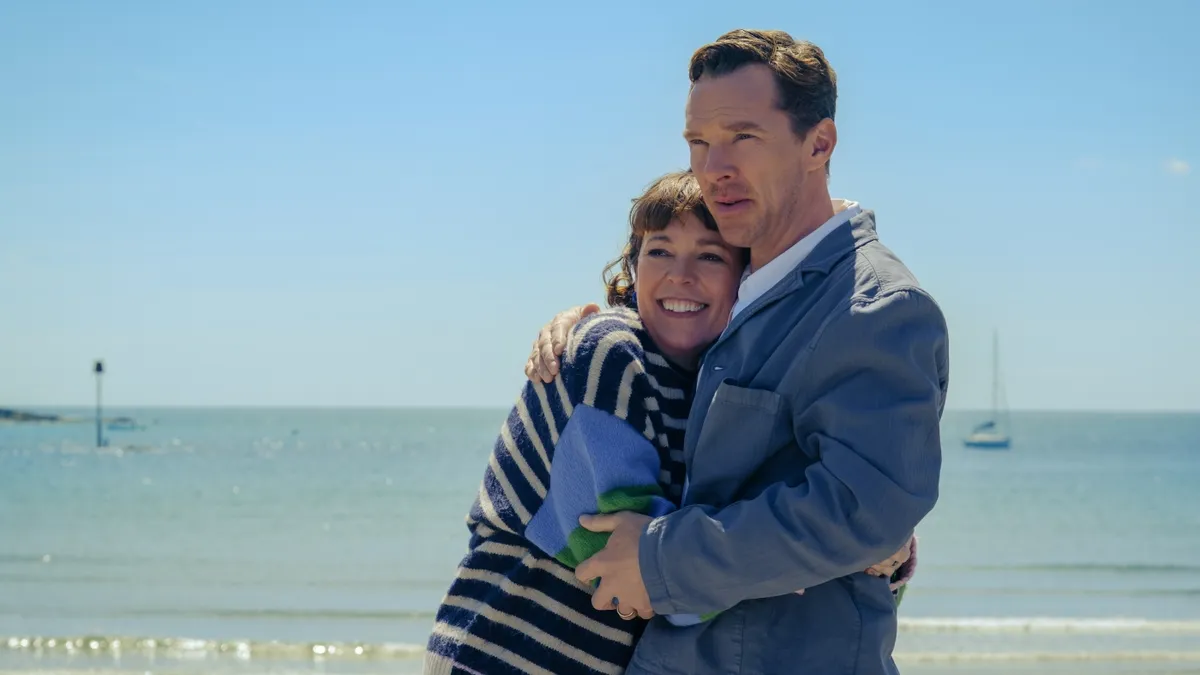
The decision to rename the new adaptation of Warren Adler's novel The War of the Roses to simply The Roses is indeed fitting. The original novel and its 1989 film adaptation, featuring Kathleen Turner and Michael Douglas, delve into a divorce filled with animosity and bitterness. In contrast, the new film, starring the talented Olivia Colman and Benedict Cumberbatch, portrays a marriage that, while tumultuous, still retains an underlying affection. This shift, while making the story more relatable and human, unfortunately diminishes its dramatic impact.
In The Roses, Olivia Colman plays Ivy, a dedicated chef who crosses paths with Theo (Cumberbatch), an architect who unexpectedly enters her kitchen. Their chemistry is palpable, and soon they find themselves living on the California coast, married with young twins. Theo is busy designing a new museum, while Ivy struggles to attract customers to her newly opened seafood restaurant. As tensions rise, a stormy night alters their fortunes, leading to a growing sense of resentment between the couple.
The majority of the film revolves around Ivy and Theo's arguments and reconciliations, often marked by tears. This dynamic echoes numerous narratives about affluent middle-aged couples grappling with boredom in their marriages. The film takes a darker turn only toward the conclusion, yet even then, it revolves around the couple's love for each other overshadowed by hurt feelings. Aside from a brief montage of spiteful behavior, most of their conflicts are quite ordinary until the finale.
There is a notable tonal hesitance in The Roses, likely influenced by its pedigree. The promotional materials highlight that it's from the director of Meet the Parents and the writer of Poor Things. Director Jay Roach, known for Meet the Parents and the Austin Powers series, and writer Tony McNamara, recognized for Poor Things and The Favourite, bring together different sensibilities. However, the film seems to struggle with its darker themes, often resembling a wacky comedy that lightly touches on serious undertones.
The supporting cast, featuring well-known comedic actors like Andy Samberg and Kate McKinnon, adds a layer of humor but doesn't fully leverage their talents. Samberg and McKinnon portray an American couple who inexplicably become friends with Ivy and Theo, but their characters lack depth. While Samberg shines in both energetic and melancholic roles, his character feels aimless, introduced through a convenient obsession with guns but ultimately serving little purpose. McKinnon, known for her quirky and often risqué humor, begins to lose her edge after repeating similar comedic scenarios. Chao and Demetriou add humor but overshoot their marks, detracting from the film's central tension.
An emotionally charged moment from the 1989 adaptation of The War of the Roses starkly contrasts with this new film. In the original, Oliver and Barbara Rose lie gravely injured in their house, symbolizing the destruction of their relationship. In a moment of potential reconciliation, Barbara rejects Oliver’s hand, showcasing the raw animosity that can exist between former lovers. This intense moment is glaringly absent in The Roses, where the characters seem incapable of such cruelty towards one another.
While a light-hearted comedy exploring the challenges of maintaining a long-term relationship has its merits, The Roses lacks the biting satire that characterized its predecessor. The charm of Colman and Cumberbatch shines through, and there are moments of genuine humor, but the film ultimately misses the original's essence. The core message of the earlier story—how deeply former lovers can despise one another—remains unaddressed in this adaptation.
In summary, The Roses is not a bad film; it features two charismatic leads engaging in a light-hearted comedy about love and the pitfalls of long-term relationships. However, it raises questions about the necessity of adapting a story that fundamentally diverges from its source material. While it’s enjoyable to watch Colman and Cumberbatch navigate their marriage, the adaptation fails to capture the original’s sharp, acidic wit. Instead, viewers are left with a standard studio comedy that is affable but ultimately disappointing. This film serves as a reminder that while adaptations can breathe new life into stories, they can also stray too far from their roots.